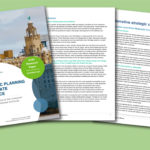The Royal Town Planning Institute (RTPI) has published a report on best practice for strategic planning for climate resilience across city regions.
Research was undertaken by RTPI staff working with the Liverpool City Region and constituent councils during 2019 and incorporates studies of good practice by planning schools at the Universities of Liverpool and Manchester.
It is hoped the analysis and evidence-base put together as part of the work will help combined authorities and other strategic planning bodies think more holistically about climate resilience and prompt them to consider climate vulnerability and risk, beyond flooding, in their plans.
Head of Policy Practice and Research at the RTPI, Richard Blyth, said: “The climate emergency has not gone away. Planning must address it full on. A strategic approach is critical for this and many other 21st Century challenges. We were pleased to work with the City Region on this useful project.”
The report’s main findings include:
- Climate policy should be set at a strategic scale because natural processes do not follow administrative boundaries. Strength in infrastructure planning comes from a joined up approach. However, it is also important to retain a degree of autonomy for local authorities, which would allow a bespoke response to localised risk.
- Joint working across city regions on climate resilience can act as a starting-point for collaboration, which may then provide the formal and informal institutional frameworks for strategic policy in other areas of spatial planning.
- The role played by planners, specifically planning officers in local and combined authorities, is key to the leading and enabling of positive change in relation to climate resilience. But plan making must be supported with resources at both a local and regional scale.
- A spatial development strategy must include an evidence base that not only demonstrates the risks of climate change, but also accounts for implementation challenges such as viability and legislation.
- Local Plans for combined authority areas must provide means to support communities to adapt to climate change and build resilience.
The report comes as the Mayor of Liverpool City Region this week launched the second stage of his ‘Our Places’ consultation, which will help form the blueprint for the city region’s approach to planning and development.
Responses to the consultation, the first stage of which was launched in October 2019, will influence the Authority’s first Spatial Development Strategy (SDS), which will set out a strategic framework for the development and use of land moving forward for at least 15 years.
When complete it is thought the SDS will be the first in the country outside of London.









